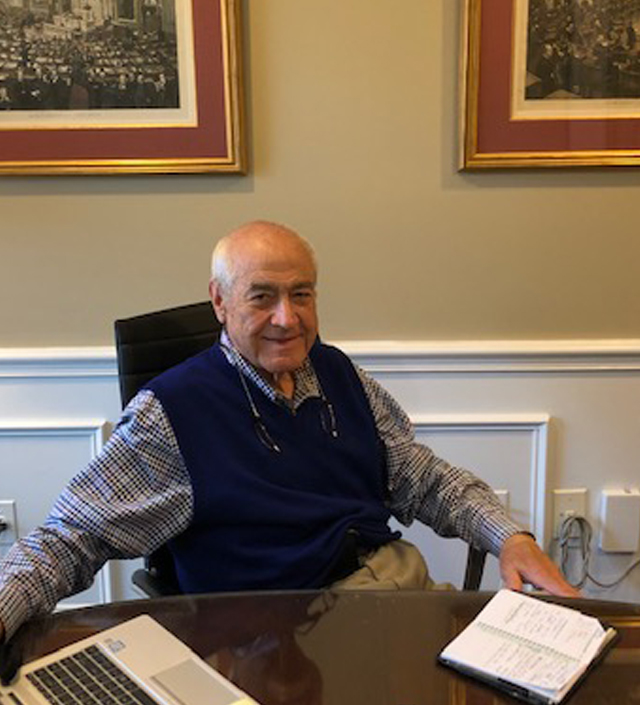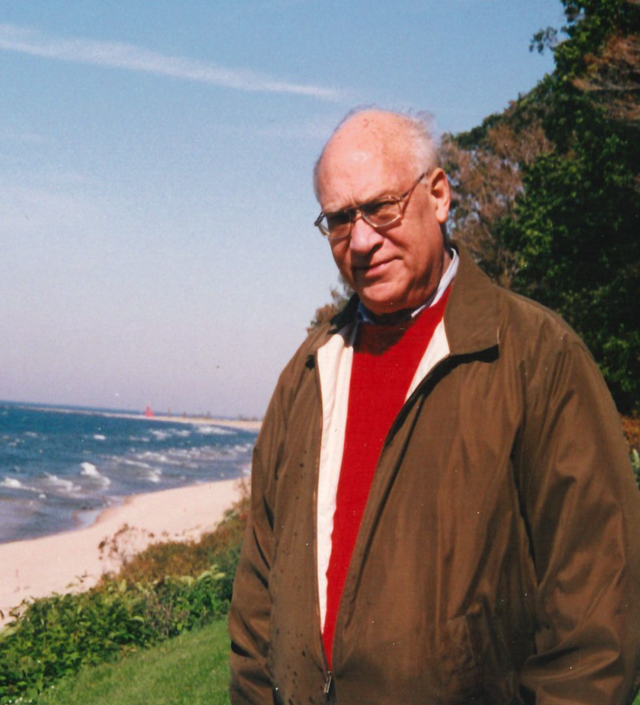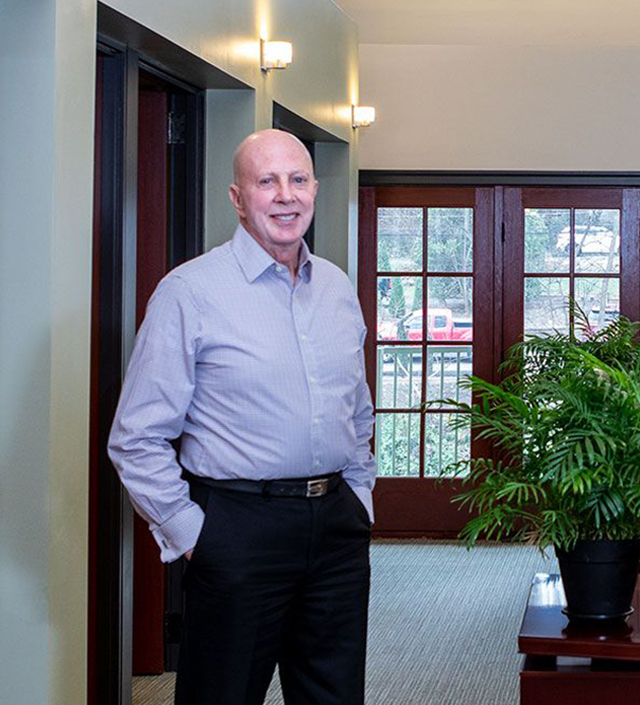Editor’s Note: This article is part of a series Rethinking65 is doing on older advisors who are continuing to work. You may also be interested in reading our articles on 82-year-old advisor Dick Wendin and 74-year-old June Schroeder. Want to suggest an advisor for the series? Contact Editorial Director Jerilyn Klein.
Donald Mosby “Don” Rembert, who tracked coin-operated phones for the Bell telephone system and built restaurant chains prior to becoming a financial advisor, didn’t just jumpstart a new career in his mid 30s — he discovered a life-long passion.
At 82, the founder of Rembert Pendleton Jackson (RPJ), a fee-only RIA firm in Falls Church, Va., still serves clients and advocates for the fiduciary rule. The firm, which continues to operate under its own name since its February 2020 acquisition by Sandy Spring Bank, manages approximately $1.58 billion in assets for about 1,000 clients.
“My career has been fantastic and my passion for staying fully engaged has only grown stronger! I have been blessed beyond my wildest expectations!!” Rembert told me in an email prior to our recent phone conversation. His optimism also permeated our call, even when he spoke of his battle last year with esophageal and stomach cancer.
“A statement I want to make is, ‘There’s hope, man, don’t give up hope,’” he said. “I went through 28 radiations, I went through 75 chemotherapies and I went through a nine-hour operation at Georgetown University, and I’m here talking with you.”
“It’s been a wild scene,” said Rembert, because the merger (a liquidity event for his firm), his surgery and the start of the pandemic all happened within weeks. “They’ve treated us wonderfully,” he says of Sandy Spring Bank, which acquired RPJ to expand its wealth management services. “It’s a marriage that I was frightened about, but holistically, it couldn’t be better.”
“Retirement is not part of my vernacular or even part of my thinking. I could retire tomorrow, it’s not an issue, but I love what I do.”
During the pandemic, Rembert has been working through the firm’s virtual private network. “Retirement is not part of my vernacular or even part of my thinking,” he said. “I could retire tomorrow, it’s not an issue, but I love what I do.”
This includes teaching his younger colleagues, whom he refers to as his kids — and some of them, he noted, are young enough to be his grandkids. His son Charlie, CEO of Rembert Pendleton Jackson, joined the 14-employee firm 26 years ago.
In addition to sharing his philosophy with his colleagues (Rembert describes himself as “a big proponent” of the Austrian school of economics), he encourages everyone to read the Uniform Prudent Investor Act.
“All in, it’s about 23 pages, but to me it’s the most important document that ever came out and still today is still not really understood,” said Rembert, who provided me with a crash course in the legislation’s history. He’s also a member of the chairman’s council of the Institute for the Fiduciary Standard.
Although Rembert’s formal education is in economics and not law, “I try to be as cognizant of the legal side of it and the economic side of it as I can possibly be,” he said.
Regarding the fiduciary rule, “The industry has been afraid to really fully endorse it, in my opinion, and so I’ve been after them to say, ‘Look, you can’t ride two horses; you’re either for the client, or you work for the company.’ You can’t do both. It’s not possible.”
Rembert also makes it a point to tell his younger colleagues “‘I wake up thinking I’m gonna learn something new every day,’ and by God, that’s been the case,” he said.
“I do all the continuing education courses, I go to conferences, I read everything I can possibly read on the topic,” he said, “and I’m involved daily, back and forth with my colleagues, with clients. I try to stay pretty much on top of everything.”
His favorite document on the weekend is WSJ Weekend, which he said he reads “ferociously.” One of his favorite books is “Thou Shalt Prosper: Ten Commandments for Making Money” by Rabbi Daniel Lapin.
When Rembert, a Christian, first read the book by Lapin, an orthodox Jew, about six years ago, “I thought, that’s so on point with me it’s kind of scary,” he told me. He then rattled off all 10 commandments, including, “Get to know yourself”; “Do not pursue perfection”; “Constantly change the changeable while steadfastly clinging to the unchangeable”; and No. 10, “Never retire.”
“That’s kind of been my mantra,” he said. Since reading the book, “I pass it around here with my kids,” he said, “and I tell them ‘If you read it, I’ll give you a bonus of $50 on the spot.’”
Rembert has also taken young advisors to court sessions to witness what happens when people don’t have a medical power of attorney, a durable power of attorney and other estate planning documents in place. In these cases, the courts make the decisions “and the family is kind of standing there with their mouth hanging open,” he said. “I can’t blame them, but if you have the right documents, you can prevent all that.”
He also stresses the importance of having young advisors join client meetings. “Where the rubber hits the road is your client relationships,” he said. “That’s super important.”
Rembert’s oldest client, a retired doctor, has been with him since 1973. “He’s a fantastic human being,” he said, and his whole practice had been clients but all the other doctors passed away.
Rembert serves as the trustee for a woman with “full-blown Alzheimer’s” and no living family. He started working for her in 1974 when she was a young analyst for the CIA. Years before she was unexpectedly struck with the disease, he promised her then-elderly mother that he would do everything he could to help make sure the client would be well taken care of. “My duty was to take care of her and that’s what I’m doing,” he said.
“I hate this Alzheimer’s stuff because so many of my clients have come down with it, and my friends,” he added. “It’s a horrible disease, it’s progressive, and generally speaking, it’s not curable.”
To stay active, Rembert golfs, hunts, fishes and goes to the beach with his family. He’s been playing the guitar since he was 10 and prior to the pandemic he played with the Folk Club of Reston/Herndon (Va.). He also started playing the piano by ear, and discovered he really enjoys it, after his wife got him an electric piano.
Following a Passion
Rembert, who has lived the majority of his life within a 15-mile radius of Washington D.C., and fished and swam in the Potomac River as a boy (“The chimes in the bell tower at Georgetown University would tell us when to go home.”), credits his parents with instilling his positive outlook.
His father, a barber at the Mayflower Hotel in Washington for 37 years, “loved what he did; he was a good barber and a good conversationalist.” he said. “My mother was a gregarious lady and a fantastic pianist on top of it all, but just a loving mother” who wanted him to take up piano. “I had a great family, a lot of support,” he said. “I was the youngest and probably got away with more than I should have.”
Rembert graduated in 1961 with a bachelor’s degree in economics from Western Maryland College (now McDaniel College), where he played on the Green Terror football team and was a member of the ROTC program. He said his ROTC battalion was the first to be invited to march at a presidential inauguration (John F. Kennedy’s).
After graduation, Rembert spent three years in the U.S. Army. Although commissioned to the infantry, the army placed him in the Quartermaster Corps after an aptitude test determined he’d be best off dealing with supplies and other things.
“I was somewhat offended by that,” he said. “I thought, I don’t want to be in the damn Quartermaster Corps — I’m better than that.”
“Well, I’m here to tell you at age 82, I look back at that and I confess, almost without trepidation, that they knew more about my aptitude than I did, and that they had nailed me correctly, because it’s been my passion,” he said. “I love dealing with this and that and the other thing and keeping things moving.”
After being stationed in Germany (where he and his wife welcomed their first child), Rembert took an honorable discharge in 1964 and joined the Chesapeake and Potomac (C&P) Telephone Company in its introductory management program.
“One of my first jobs was to orient, find, isolate and know the revenue streams that were coming in from the coin telephones. At that time, there were 25,000 coin phones in operation around metropolitan Washington including the National Airport,” he said. “The issue was what are they producing and how you’re collecting correctly and so forth — it was a heck of an assignment.”
Rembert was promoted to service representative and then to a position in the human resources department. Although C&P Telephone was a good experience, “I had gotten somewhat jaded about Corporate America — you know, the three legged stool with shareholders, the public and the employees,” he said. “Then I got to thinking with a buddy of mine and we said, ‘Why don’t we go in business? Let’s open restaurant.’”
The first one they built was the Charcoal Inn in Bowie, Md. “I was going to work for the Bell (telephone) system, working day and night, and I also was working with my restaurant,” he said — which he expanded to three restaurants. In the late 1960s, he left the phone company, where he had continued to get promoted, to work full time in the restaurants.
In the early 1970s, he sold his restaurant company and went to work for the owner of a number of Lum’s restaurant franchises. Rembert helped grow this business to nearly 550 employees and 17 locations (including Ollie’s Trollies restaurants), he said.
“I had a flare for it, much to my amazement — the busier it was, it seemed the more I liked it — but I also learned during that time that there were so many small businessmen that were struggling to do anything,” he said. “And I thought, if I could go out there and become a consultant, it would be worthwhile.”
So Rembert and a couple of his buddies (including a Wharton Business School graduate) started a financial planning firm, he said, and the family of the man who owned the restaurant chain he went to work for are still his clients — nearly 50 years later.
“I’ve got a great family — six grandchildren, three children, beautiful wife, celebrating our 60th wedding anniversary in June of this year,” said Rembert, “so it’s been a trip, and a great trip.” He also chatted about his grandchildren’s studies and career interests, including business and medicine.
He has told college-bound students, “You’ve gotta get an aptitude test because it’s you against the world,” he said. “The younger you are, and the more you get a feeling for where you’re going in life, the better it will be.”
“I mean, I’ve seen people so miserable in professionals — you know, accountants and lawyers and doctors — it breaks your heart,” said Rembert. “Why are you doing this to yourself? Find your passion and follow it.”
Jerilyn Klein is editorial director of Rethinking65.







